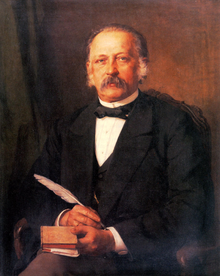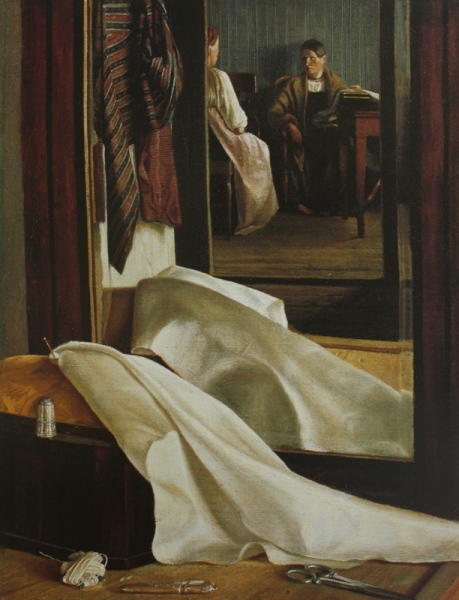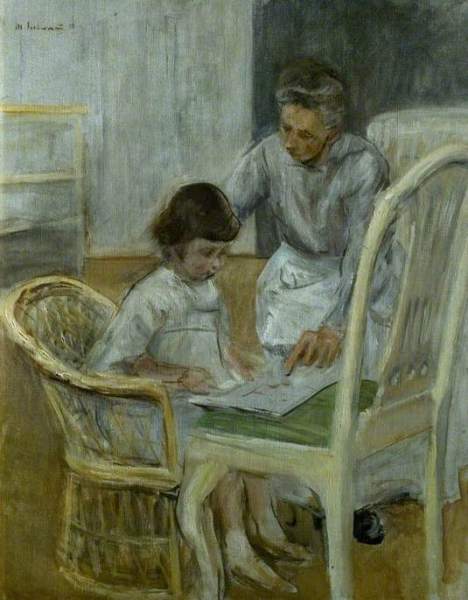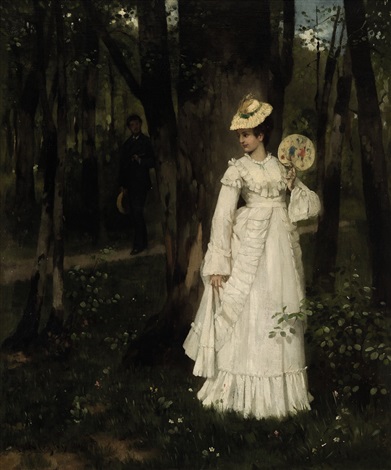Find a book

A Book a Month
We can send a book a month for six or twelve months - the perfect gift. More »

Café Music
Listen to our album of Café Music while browsing the site. More »

A new perspective on a Persephone book.
Persephone Book No. 121 Effi Briest by Theodor Fontane
Theodor Fontane, b. 1819, is a major figure in German literature (but unfortunately little known in the UK). At the bi-centenary celebrations of his birth five years ago there were several exhibitions, an installation, two bus tours, a boat trip, several guided walks, a bicycle ride, readings, lectures, a dinner based on meals in his novels, and theatrical productions including at least two of Effi Briest. The first stuck closely to the novel, the second Effi in the Underworld, in which a group of adolescents considered how they behave when they reach the 'limits of standards' (the website has been Google translated!) featured a character called Steffi Beast, a contemporary character 'who actively deals with borders, and rubs against them constructively.' I think we can work out what that means, although it is not at all clear that poor Effi manages to rub against the borders constructively.

Theodor Fontane, 1883 by Carl Breitbach
Having delivered her first, and only, child, Effi von Instetten’s doctor squeezes her hand, and says: ‘Today is the anniversary of the Battle of Königgrätz; a pity it’s a girl,’ pithily and with casual, probably inadvertent, cruelty, summing up the values of the Prussian aristocracy of the nineteenth century: an essentially military caste, in which a woman’s position would be dependent first on her father and then on her husband.
Effi (née) Briest is seventeen years old, her husband, the Baron, is thirty-seven. Many years earlier, as a nineteen-year-old lancer, he had courted her mother. The attraction was mutual, but the match was deemed unsuitable – the couple were too young, and, though noble, he was not sufficiently rich – and Louise had married von Briest, a prosperous landowner and local dignitary, twenty years her senior: a comfortable marriage, but, we deduce from their conversations, a far from passionate one. The Baron had resigned his commission (there had been talk of a suicide attempt), then briefly rejoining the army during the Franco-Prussian war, in a different, and by implication less prestigious, regiment; Fontane’s reader would grasp that no political career in Prussia, however successful, could make up for an abandoned military career.
Effi Briest opens on the day of Instetten’s first visit to the Briests’ ancestral home, which triggers one of many questions. Fontane engages us not with facts, but with tantalising details, often conveyed in dialogue, inviting us, as in life, to draw our own conclusions about characters and events. The 'whole picture' is for the reader to paint. Interestingly, in the wonderful 1974 Fassbinder film of Effi Briest, many significant scenes are viewed in mirrors, or through nets, often showing characters from the back, or at an unexpected angle, an indirectness that precisely mimics Fontane’s.

'Reflection in the Mirror' by Grigory Soroka c. 1850, Russian Museum, St Petersburg
Why is Instetten visiting after seventeen years? Has he been waiting for the daughter of the woman he once loved to reach marriageable age? He asks for her hand after one brief meeting, so brief that Effi needs to be reminded of it. What are his motives? Is there an element of revenge? Is he looking for a re-incarnation of the wife he was forced to forego? Is Effi’s mother, Louise von Briest, somehow colluding in this? She deliberately offers up a child-bride, presenting her in her play-clothes, a smock with a sailor collar: ‘You look completely ravishing like this – completely natural and unprepared, and this is very important under the circumstances.’ What circumstances? Does she believe that the Baron will see in her daughter her own young self? Does she want him to be reminded of their youthful affair?
With considerable insight and rare frankness, her husband says that Louise ‘would have been much more at home with Instetten than Effi’; she assures him that ‘the past is the past … and there is no point in constantly harping on youthful aberrations’. Briest replies that he was only trying to raise her spirits: a curious exchange, which suggests that the subject has been discussed before. Effi’s father is a kind man, why does he not object more strongly to the match?
Effi is pretty, aristocratic, and young, the only daughter of a rich man: there would be no shortage of suitors. Why does she so readily agree to marry a man twenty years older, whom she barely knows? Asked by her friend if he is ‘the right one’, she answers dismissively, ‘You don’t understand these things, Hertha. Anyone is the right one so long as he has a title, a good position and good looks.’ Her father has taught her that love and tenderness, though desirable, are 'nonsense', but she confidently looks forward to wealth and a splendid house. Her mother has assured her that she will ‘at the age of twenty have a position which other women hardly achieve before they are forty. You will go further than your mama.’ Status, it seems, is everything, and status depends on being married to the right man.
Louise knows that Effi’s material ambition will be satisfied, but fears that her thirst for play and adventure will not: 'He won’t provide much entertainment for her. And the worst of it is: it won’t even occur to him that he ought to. That will be all right for a while and no great harm will be done, but in the end she will become aware of it and it will hurt her …’ She knows from experience the sacrifice involved in marrying for status rather than love. Why is she so eager for her daughter to share her fate?
The difference in age between the von Briests is exactly the same as between the Baron and Effi, a point which Fontane does not labour, but rather leaves us to notice, or possibly overlook: throughout the novel we are scarcely aware of the authorial voice. Fontane is rarely judgmental. If so many questions hang in the air, it is not because of any lack of plotting or sketchy characterisation, but rather because Fontane is sensitive to the multiple and often contradictory impulses driving people, some but not all disclosed in their conversations with others, or in moments of self-examination. For all her impetuosity Effi does not reveal much to her mother, who remarks that ‘a complete surrender of her thoughts is not in her nature.’
Effi’s father loves her spontaneity, while her mother worries that she is impetuous, soft and compliant, with ‘something ruthless in her make-up’ that will make her take risks. Nineteenth-century Prussian society did not value spontaneity, particularly in women. A man might have ‘a gambler’s instinct’ and escape censure, but a woman must tread warily, and cultivate discretion (her mother’s warning), and eschew the unconventional, which, in the words of the local apothecary, Effi's one true friend, is invariably ‘paid for with happiness.’
The residents of Kessin, a small Baltic port where the Instettens start their married life, consider Effi to be too much a product of Berlin, an atheist, ‘infected with rationalism, and, perhaps worst of all, they disapprove of her clothes, which are ‘not sober enough’, insufficiently conventional. The Baron is concerned that she might not adapt to Kessin, not settle down, but his concern is largely for himself: ‘Will you become popular, and secure me a majority if I stand for Parliament?’ Instetten is deeply selfish. He makes no apology for the Prefect’s Residence, a sinister timbered house, cruelly fanning Effi’s fears that it might be haunted, while refusing to move: ‘I can’t have the townspeople saying that Prefect Instetten is selling his house because his wife has been haunted by the picture of a Chinaman stuck to the back of a chair. It would finish me, Effi. I would never be able to live it down.’
Instetten’s reputation means everything to him. That his first love should have forsaken him for an older, more prosperous, man, did more than break his heart. It inflicted a deep wound on his honour, and as he perceived it, reduced him in the eyes of others. In marrying Effi he has exacted revenge on von Briest (and on Louise), and redeemed his reputation. This is no love match. As a husband, he is cold, ‘frosty as a snowman’, says Effi, there is ‘something remote about him even in his caresses’ which she describes as ‘perfunctory’. She admits to her mother that there have been times when she feared him, but she gets used to it, ‘… he’s got me where he wants me … if a man is too amorous it only makes people laugh, especially in view of the difference in our ages.’

'The Artist's Granddaughter with her Nurse' (1919) by Max Liebermann (New Walk Museum, Leicester)
The Baron is often absent and inattentive when he is at home. Of Effi's two servants, only one is reliably loyal to her: Roswitha, engaged to care for their child, a simple woman, raped as a girl, disgraced by the birth of a bastard baby. Joanna, her maid, chosen by Instetten, is devoted, but to the Baron and not to her mistress. Effi, who had dreamt of entertaining princes, is lonely, bored, and frightened, but stoically resigned to her lot.

'Meeting in the Park' by Edouard Niczky (1850-1919)
Although social approval does not concern her, Effi pushes beyond ‘the limits of standards’, and she must, eventually, pay the price. She has freely admitted to not having principles, she cannot escape the opprobrium of those closest to her who do have them, who cannot relax them whatever the consequences. The social code of the Prussian aristocracy, which would destroy this enchanting heroine, was a code still so strong that neither her husband nor her parents could challenge it, even if they might have wished to.
